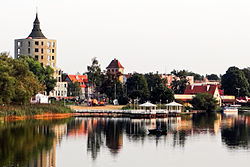Szczytno
| Szczytno | |||
|---|---|---|---|

View of the lake.
|
|||
|
|||
| Coordinates: 53°33′46″N 20°59′7″E / 53.56278°N 20.98528°E | |||
| Country |
|
||
| Voivodeship | Warmian-Masurian | ||
| County | Szczytno County | ||
| Gmina | Szczytno (urban gmina) | ||
| Established | 1359 | ||
| Town rights | 1720 | ||
| Government | |||
| • Mayor | Danuta Górska | ||
| Area | |||
| • Total | 9.96 km2 (3.85 sq mi) | ||
| Population (2007) | |||
| • Total | 27,013 | ||
| • Density | 2,700/km2 (7,000/sq mi) | ||
| Time zone | CET (UTC+1) | ||
| • Summer (DST) | CEST (UTC+2) | ||
| Postal code | 12-100 to 12-102 | ||
| Area code(s) | +48 89 | ||
| Car plates | NSZ | ||
| Website | http://www.e-szczytno.eu | ||
Szczytno [ˈʂt͡ʂɨtnɔ] (German: Ortelsburg) is a town in north-eastern Poland with 27,970 inhabitants (2004). Szczytno is situated in the Warmian-Masurian Voivodship (since 1999), but was previously in Olsztyn Voivodship (1975-1998).
Olsztyn-Mazury Regional Airport, located nearby, is the most important airport of the Masurian region. Szczytno, which is located on the Olsztyn – Ełk line, and used to be a railroad junction until Polish Railways closed minor connections stemming from the town towards Czerwonka and Wielbark.
Near Szczytno are the only known megalithic tombs in Warmia-Masuria and the former East Prussia. The town was originally an Old Prussian settlement.
Between 1350 and 1360 Ortolf von Trier, a knight of the Teutonic Order and the Komtur of Elbląg (Elbing), founded a fort in the Old Prussian region of Galindia, probably near an Old Prussian settlement. The first mention of the fort, eponymously named Ortulfsburg, was a document from September 1360, after Ortolf invited Masovian colonists, among whom the settlement became known as Szczytno. The first custodian of the settlement was Heinrich Murer. In 1370 the wooden fort was destroyed by Lithuanians led by Kęstutis, after which it was rebuilt using stone. In German, the name Ortulfsburg gradually morphed into Ortelsburg. The settlement grew in size owing to its location on a trade route from Warsaw to Königsberg (now Kaliningrad).
...
Wikipedia



